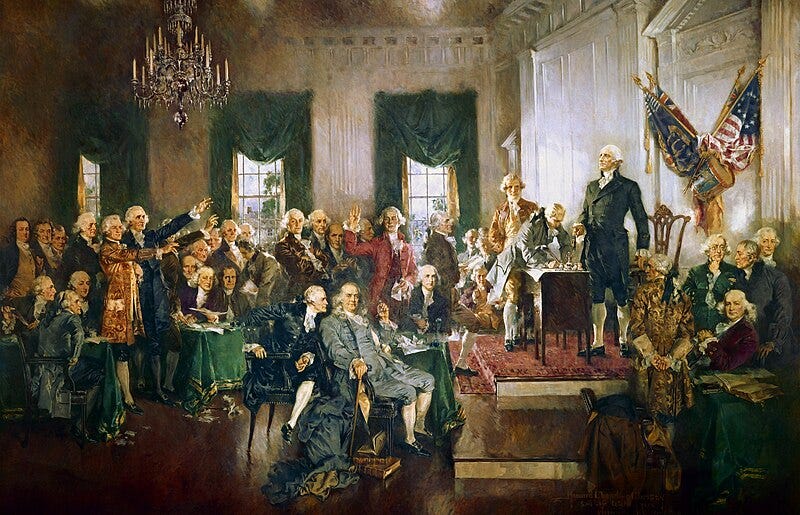Updated: As written, is the Protecting the Right to Organize Act (aka PRO Act) unconstitutional?
* See update at bottom
As written, is the Protecting the Right to Organize Act (aka PRO Act) unconstitutional, or would it require a constitutional amendment?
Although seemingly dead for now, as/if the Protecting the Right to Organize Act (aka the PRO Act) were to ever get passed by Congress and signed into law, it would seem that one of the first (and most important) arguments that would cause it to be overturned would be on the basis that at least one (if not two) provision(s) may be unconstitutional.
The PRO Act specifically requires an employer and the representative of its employees (a union) to agree to a contract within 90 days; if that fails, the parties are required to go into mediation for 30 days; and, if mediation fails, the parties are required to submit the contract dispute to arbitration.
Here is the relevant part, as written into the PRO Act (with emphasis added):
(B) If after the expiration of the 90-day period beginning on the date on which bargaining is commenced, or such additional period as the parties may agree upon, the parties have failed to reach an agreement, either party may notify the Federal Mediation and Conciliation Service of the existence of a dispute and request mediation. Whenever such a request is received, it shall be the duty of the Service promptly to put itself in communication with the parties and to use its best efforts, by mediation and conciliation, to bring them to agreement.
(C) If after the expiration of the 30-day period beginning on the date on which the request for mediation is made under subparagraph (B), or such additional period as the parties may agree upon, the Service is not able to bring the parties to agreement by conciliation, the Service shall refer the dispute to a tripartite arbitration panel established in accordance with such regulations as may be prescribed by the Service, with one member selected by the labor organization, one member selected by the employer, and one neutral member mutually agreed to by the parties. The labor organization and employer must each select the members of the tripartite arbitration panel within 14 days of the Service’s referral; if the labor organization or employer fail to do so, the Service shall designate any members not selected by the labor organization or the employer. A majority of the tripartite arbitration panel shall render a decision settling the dispute as soon as practicable and not later than within 120 days, absent extraordinary circumstances or by agreement or permission of the parties, and such decision shall be binding upon the parties for a period of 2 years, unless amended during such period by written consent of the parties. Such decision shall be based on—
(i) the employer’s financial status and prospects;
(ii) the size and type of the employer’s operations and business;
(iii) the employees’ cost of living;
(iv) the employees’ ability to sustain themselves, their families, and their dependents on the wages and benefits they earn from the employer; and
(v) the wages and benefits other employers in the same business provide their employees.
As the PRO Act is currently written, this seems to be a government-required-and-enforced-tribunal dictating wages, benefits and other terms and conditions of employment on employers, unions and (as importantly) employees.
Is that constitutional?
It would seem that this provision of the PRO Act would contravene the Founders' intent in Article I, Section 10, Clause 1, which states:
"No State shall enter into any Treaty, Alliance, or Confederation; grant Letters of Marque and Reprisal; coin Money; emit Bills of Credit; make any Thing but gold and silver Coin a Tender in Payment of Debts; pass any Bill of Attainder, ex post facto Law, or Law impairing the Obligation of Contracts, or grant any Title of Nobility."
*Update: Despite a long history of Supreme Court decisions on the topic, as one reader correctly points out: “The Contract Clause applies to the states, not the federal government,” there are additional potential Constitutional arguments that may make the PRO Act vulnerable to scrutiny, namely the the Fifth and Fourteenth Amendments:
The Fifth Amendment states:
No person shall be held to answer for a capital, or otherwise infamous crime, unless on a presentment or indictment of a Grand Jury, except in cases arising in the land or naval forces, or in the Militia, when in actual service in time of War or public danger; nor shall any person be subject for the same offence to be twice put in jeopardy of life or limb; nor shall be compelled in any criminal case to be a witness against himself, nor be deprived of life, liberty, or property, without due process of law; nor shall private property be taken for public use, without just compensation.
The Fourteenth Amendment, Section 1 states:
All persons born or naturalized in the United States, and subject to the jurisdiction thereof, are citizens of the United States and of the State wherein they reside. No State shall make or enforce any law which shall abridge the privileges or immunities of citizens of the United States; nor shall any State deprive any person of life, liberty, or property, without due process of law; nor deny to any person within its jurisdiction the equal protection of the laws.
Although those Amendments, too, would seemingly not apply to Congressional action (as opposed to State action), the PRO Act gives the government the ability (through an arbitration tribunal) to “take” from employers in the form of higher wages, benefits, etcetera.
What are your thoughts?
For further reading:
Freedom of Contract by David E. Bernstein, George Mason University School of Law [in PDF]
Freedom of Contract: A Bedrock of Freedom by George Leef, the Future of Freedom Foundation




